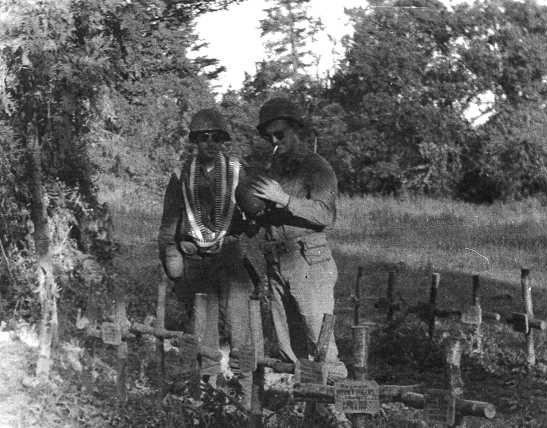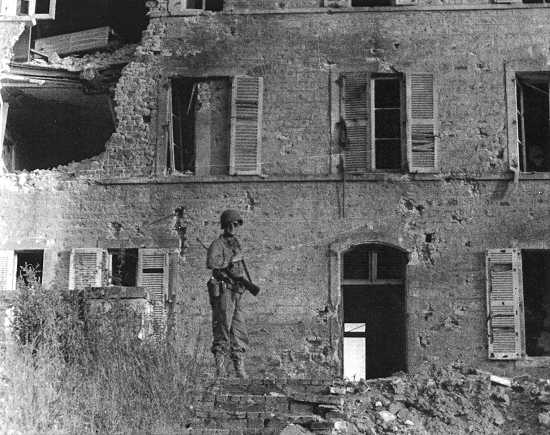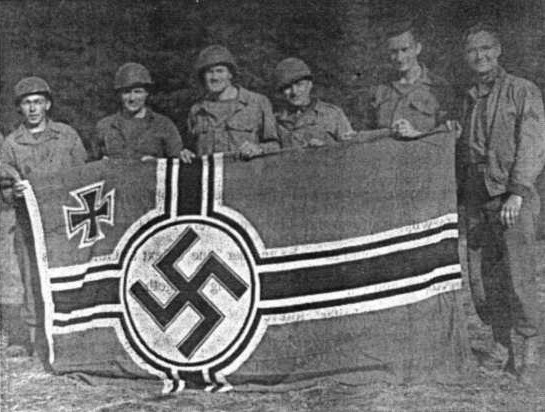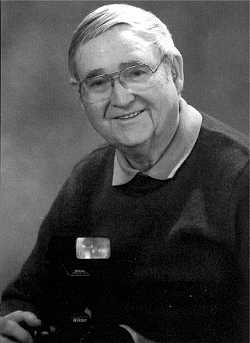A LETTER FROM THE WAR:
WILLIAM ARNOLD WRITES FROM BELGIUM
William Arnold is best known around Henderson County for his artistic eye with the camera, photographing children, families and local events.
But during World War II, Mr. Arnold was fighting for his life in Europe, capturing with his camera the "ugly" scenes of war, far from the smiling poses of friends and family. He was missing in action for several days while he hid from German soldiers in an abandoned chateau in Brittany. He often developed his film in his helmet.
The letter which follows was written to Henry Barry, former publisher of the Lexington Progress. The letter and a U.S. Army news report of the Battle of Brest were published in the November 24, 1944 edition.
(excerpt)
The Story of Brest; of Ruins, of Prisoners, Beaten Nazi Chiefs, Still
Arrogant in the Midst of Debris
It took no expert knowledge to
estimate the destruction of Brest. The city was virtually 100 percent destroyed
when the Germans finally surrendered it at 1500 hours Tuesday, hardly a
building but was gutted. The entire operation lasted three weeks and four days,
during which approximately 37,000 prisoners were captured--a figure that
supported early estimates that some 50,000 enemy troops had taken refuge in the
old city on the tip of the Brittany peninsula.
Dear Henry:
I am enclosing a copy of the "Story of Brest" that was published in the "Stars and Stripes," September 25, 1944. I thought you might perhaps find it of interest. Personally, I think the story is about the best and most complete that at this time can be told concerning military operations. I encountered this first hand and can truthfully say that unless one has seen such destruction, it would be difficult to conceive of a city the size of Brest being as completely destroyed. I did not see a single building within the city but what was completely destroyed by either shell fire and fire. It was a horrible mess.
I'm sure that there are quite a number of men in the county who will remember Brest from the last war, as it was one of the major ports of France that was used by the Americans for landing troops. The taking of this city involved mostly street fighting and heavy bombardment by AAF and RAF and American artillery, together with heavy shelling from the British fleet. It was quite fascinating to have a ring side seat when our P-47s and P-51s were dive bombing the city, and the devastation that was wrought is hard enough to describe in words. I am fortunate enough to have a good camera with which I have recorded on film many of these operations. Being an Artilleryman, I naturally find Artillery operations of interest and can say that the American Artillery is the best in the world. The days and nights that our heavy guns were shelling the German positions at Brest will always be a vivid memory to me. These guns would roar day and night and never let up, and the ground would literally shake under one's feet, and with each round of fire, it would feel as though some invisible hand was tugging at one's shirt and trousers and always that funny feeling in the pit of the stomach. During the campaign all had become so used to the constant roar of both artillery and planes that when it did stop, the eerie quiet was more nerve wracking than the guns were. Once a person becomes used to battle noise, they cease to annoy him as much as does the quiet and inactivity.
Never will I forget my first night in France under shell fire during those early days of the invasion when we were holding such a very small tip of the Normandy peninsula. I don't mind admitting that I was scared silly with the German 88s whistling overhead, and the stench of death all around was terrific, and then as time went on, I became used to such things and paid no attention to them.
Those early days are now history and we are now in what I hope is the final stage of the war. The American Army cannot be stopped and it is not far from Berlin, and I hope we are there before Christmas.
I used to think that the red clay of Henderson County was the worst in the world, but after encountering this sea of mud in Belgium, I have decided that at its worst, Tennessee is heaven compared to this country. Winter is setting in fast, and I dread to think of what it will bring. I don't see how the Jerries can go through another winter and take the terrific pounding they are getting, and am of the opinion that the next few weeks will see the end of hostilities over here.
Time for chow, so must close and hit the line. Best of luck to you and yours.
As ever, Bill Arnold

William Arnold and an Army Buddy look over a German cemetery in Brittany.
Americans
carried out the bodies of their war dead while the Germans often buried their
troops where
they found them.

Damaged building near Brest.

World War II soldiers including William Arnold (far right) hold a garrison
flag captured
from the Gestapo headquarters in Brest, France. (This photo was printed in
the
May 27, 1997 issue of the Lexington Progress and is reproduced
here,
unfortunately, from a xerox copy, thus the poor quality.)

"Photographs by Arnold" are a Lexington tradition. Since 1930 William Arnold has preserved the history of Henderson County through his photographs. His photographic archive contains the negatives of every photograph he has ever taken. He photographed students for the LHS annual for more than 40 years. (Photo-William Arnold)
Photograph of William Arnold scanned from Henderson County, Tennessee: A Pictorial History, by Emily Davis and Brenda Kirk Fiddler.
